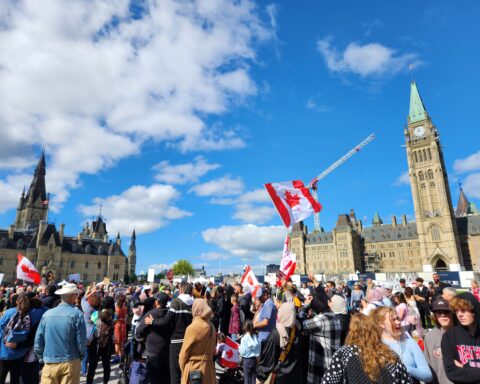Governments and bureaucrats need to focus less on numbers and more on starting real conversations that tackle critical problems, like race, in ways that engage immigrants rather than shaming them.
“A lot of time when it’s about race, we are afraid to talk about it,” said Yolande James, one of four speakers from the government and legal system who presented at the “Identities, Rights and Migration: A Session on the Intersection of Gender, Race, Class and Sexuality” session at the 18th National Metropolis Conference held in Toronto last week.
“There is a way to have a conversation involving everybody, to be respectful and constructive. Everybody has something to give and we should have an equal life.”
James, a former provincial politician, was the first Black female cabinet minister in Quebec history, serving as Minister of Immigration and Cultural Communities & Minister of Family between 2007 and 2014.
As a former provincial government minister, and child of immigrant parents herself, James knows about how inefficient all levels of government are in engaging newcomers into their host country.
“Do we engage immigrant populations? Do we have engaged dialogue?” she asked. “We haven’t done enough.”
She said the lack of society-wide conversations that engage with immigrants sends the message that they do not matter.
“I feel the whole nation, in terms of why the issues touching immigration and diversity [are] important, is not engaged,” she said. “It’s all about being able to engage people to connect with other people’s experience.”
“There is so much emphasis on the numbers, but it’s not important. It’s about their journey.”
As an example, James pointed to the current challenge of accepting Syrian refugees to Canada. She said that the government needs to pay attention to more than just the number of refugees being accepted.
“Should it be 55,000 or 50,000?” she asked. “There is so much emphasis on the numbers, but it’s not important. It’s about their journey,” she said.
Case in point: Iran sanctions
Another contemporary example is the government’s inefficiency in communicating with immigrants about the sanctions against Iran in 2010 by the former Conservative government.
Theoretically, sanctions against Iran were not meant to target Iranian citizens or Iranians who immigrated to Canada, but instead to put pressure on the Iranian government.
However, a large number of Iranian Canadians were caught in the crossfire and penalized by Canada, said Iranian Canadian lawyer Negar Achtari who practises in Ottawa.
“The impact of the sanctions on Iranian Canadians is everywhere in the ordinary Iranian immigrant’s daily life.”
“The impact of the sanctions on Iranian Canadians is everywhere in the ordinary Iranian immigrant’s daily life,” she explained.
“The federal government restricted money wiring from Iran to Canada. Manitoba and Quebec announced they were not accepting Iranian immigrants under [the] investment category. CIBC and TD banks proceeded to close Iranian Canadians’ bank accounts, sweeping their assets from chequing accounts to credit cards and mortgages, frozen without notice.”
She also mentioned another resulting impact – the Canadian Border Services Agency seizing Iranians’ belongings upon their arrival to Canada for a time-consuming scrutinization.
“We believe governments are our guardians. What they’ve done is simply wrong,” said Achtari. “When and to whom do these [sanctions] apply? There is only silence from the government. What they tried to say is, ‘figure it out on your own!’”
Despite laws in place, discrimination persists
Avvy Go, human rights lawyer and clinic director at the Metro Toronto Chinese and Southeast Asian Legal Clinic, shared her experience of asking for redress and compensation from the Canadian government for the Chinese Head Tax victims and their descendants almost 10 years ago.
[R]acialized women earn 55.6 per cent of the income of non-racialized men.
She was one of a dozen activists who mobilized many community activities asking the Liberal government at the time, led by Prime Minister Paul Martin, for redress and monetary compensation.
Along with an official apology, the Harper Conservative government gave $20,000 to direct victims who paid a $500 head tax in the early 20th century in order to come to Canada.
According to Canada’s Colour Coded Labour Market report, racialized men are 24 per cent more likely to be unemployed than non-racialized men.
Racialized women have it worse: They’re 48 per cent more likely to be unemployed than non-racialized men.
This many contribute to the fact that racialized women earn 55.6 per cent of the income of non-racialized men.
Go used these figures to highlight that although anti-racism and anti-homophobia laws are in place, discrimination continues to exist.
Shan is a photojournalist and event photographer based in Toronto with more than a decade of experience. From Beijing Olympic Games to The Dalai Lama in Exile, she has covered a wide range of editorial assignments.





